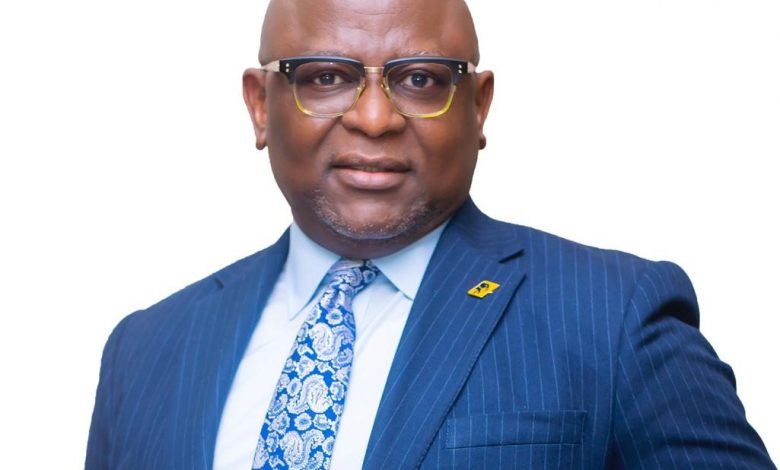FIRST BANK : CAGING THE STORMS ,MOVING AHEAD.

‘’ It is only during the storm that the tree knows how strong it is “ . This notable saying, no doubt , confirms the resilience and strength of First Bank. In the last five years , it has battled the burden of toxic loans . However, with deft application of experience and professionalism , the financial supermarket and pillar of the nation’s economy, did not and has not reneged in its responsibilities to its constituencies . No doubt , the challenge was tough and herculean but the bank has continued to put it behind itself and deliver its services effortlessly.
Under Adesola Adeduntan ,its MD/CEO , the bank sustained its momentum driven by the belief that the tough gets going when the storm is violent . In fact, some analysts believe this might be one of the reasons why the Central Bank of Nigeria ,CBN, swiftly upturned his premature removal by the rancorous board recently . Ironically ,he inherited the toxic loans from his immediately predecessor .
The exposures were mainly to the domestic oil and gas companies that bought oil fields from the oil majors like Shell and others when the price of oil was above $100 per barrel . This crisis crept in after 2015 oil price crash, though it started in the middle 2014 when the oil price started nose diving ; 47 percent of its loan book comprised of oil and gas debt . In 2016 recession in Nigeria aggravated the situation on ground .Both had very grievous impacts on the health of banks not only on FBN.
However, the end is ,no doubt , in sight , notwithstanding the recent boardroom crisis which is not unusual in a financial supermarket like FBNH’s size . The fact is that beautiful souls are shaped by ugly experiences . The management has developed an iron teeth to break the hard nut while resiliently caging the storm . The management has continued to assure its stakeholders there is no cause for alarm with the end very much in sight and the hope of a cornucopia of returns palpably on the horizon.
This assurance may not be farfetched. As soon as he mounted the mantle leadership , Adeduntan ,a thoroughbred banker with his highly professional team swooped into actions and embarked on book cleaning exercise to strengthen the bank’s balance sheet . The regulatory authorities particularly the Central Bank of Nigeria, CBN, did not leave the bank in the lurch as it extended forbearance to it ; the bank too swiftly moved to cage the raging storm.
First Bank management has done a good and commendable job . In this environment, banks face a skeptical if cynical public. Rightly so; what with the proclivity for the interest mongers to duck festering positions behind spruced up figures. Not so for First bank; instead , the bank is once again proving to be a role model in corporate governance and taking tough decisions to end a dragging battle of toxic loans once and for all .
Adeduntan went to work, sleeves rolled-up, digging a trench for bad and delinquent loans and entrenching good governance with full disclosure . The bank equally pursued its debtors making recoveries .
The bank’s robust risk management framework ensured that the cost of risk reduced significantly This was achieved through the reduction in impairment charges re-affirming the bank’s enhanced asset quality. In the same breadth, coverage ratio increased appropriately over the same period, an indication of prudent disposition consistent with the bank’s known record of excellent credit risk management. In 2015 financial year, the bank wrote off N127 billions worth of loans that were fully provisioned coupled with some NPLs that were recovered. By the end of that year the bank problem loans dropped by 49 percent to N273 billions .Since then , the bank has sustained its book cleaning effort. As at the end of 2019 , it equally wrote off N366.4 billions . By the end of that year the value of absolute NPLs was N196.9 billion . The bank non performing ratio has been drastically reduced to single digit in the 2019 financial year. NPL ratio fell to 9.9 percent in line with the management guidance of a single digit ratio by the end of the financial year as against 24.7 percent in 2018 financial year .
More positive signals on the battle against the credit risk became more evident with impairment charges coming steeply down by 41.5 percent and the cost of risk rolling down to 3 percent from 4.2 percent between 2018 and 2019
The book clean up is a strategic move as the exercise is expected to serve as a sinecure for a stronger balance sheet in the coming years
In 2020 , the bank faced the challenge of the economic headwinds from the pandemic . In spite of this , the bank’s asset quality saw further improvement . U.K Eke, the Group Managing Director commented: “the bank has continued to enjoy the benefits of our retooled and strengthened risk management architecture. This is evidenced by a 1.0% y-o-y decline in impairment charge to N50.6billion compared to N51.1billion in 2019 , declining NPL ratio to 7.7% against 9.9% in2019 with vintage NPLsustained at less than 1.0% and improving cost of risk of 2.4% (Dec 2019: 2.6%). The impact of the COVID-19 pandemic was muted because of a well-diversified loan book and minimal exposure to sectors most affected by the pandemic.
“ I am also delighted with the improved risk management processes and architecture which continues to yield positive results. Consistent with our commitment to a single-digit NPL to the market, we further reduced the ratio to 7.7% (Dec 2019: 9.9%)” he added .
Table 1: Percentage Change in Bank’s NPL Ratio
| Banks | 2020 | 2019 | % Change |
| Access | 4.30% | 5.80% | -25.86% |
| ETI | 7.60% | 9.70% | -21.65% |
| FCMB | 3.30% | 3.70% | -10.81% |
| GTB | 6.39% | 6.53% | -2.14% |
| Stanbic IBTC | 4.00% | 3.90% | +2.56% |
| Sterling | 1.90% | 2.20% | -13.64% |
| Union | 4.00% | 5.80% | -31.03% |
| Unity | 0.001% | – | – |
| Zenith | 4.29% | 4.30% | -0.23% |
| Fidelity | 3.80% | 3.30% | +15.15% |
| UBA | 4.70% | 5.30% | -11.32% |
| FBNH | 7.70% | 9.90% | -22.22% |
With the clean up exercise almost perfected , sanity has been restored . This is confirmed by the CBN governor himself . “ The act of replacing First Bank’s Managing Director who still had eight months left in his five-year tenor is unacceptable to the regulator, especially since the regulator felt comfortable with the balance sheet turnaround supervised by the management team led by the Chief Executive Officer (CEO).”, he noted
The reason behind the above view of the CBN governor may not farfetched . Though shaken ,First Bank remains a major financial and economic pillar despite the storm .
Emefiele in his announcement concerning the dissolution of the Boards of FBN Holdings (FBNH) and FirstBank on Thursday 29 April 2021, noted that ” FirstBank is one of the systemically important banks in the Nigerian banking sector given its historical significance, balance sheet size, large customer base and high level of interconnectedness with other financial service providers, amongst others.
Even its current financial position or health does not portend any danger or threat to its stakeholders. “By our last assessment, FirstBank has over 31m customers, with deposit base of N4.2trn, shareholders funds of N618bn and NIBSS instant payment (NIP) processing capacity of 22% of the industry”.
Though there is a slowdown its profitability relative to its peers ,the bank is still profitable and shall soon recover its rightful profitable position.
.During the year 2020, Profit before tax grew 11.2% y-o-y to N83.7 billion and our non-interest income recorded a growth of 26.7% y-o-y to N174.7 billion. These results were despite the challenging rate environment evidenced by the decline in fixed income rates and higher cash reserving requirements leading to a 10.9% y-o-y decline in interest income to N384.8 billion. However, the management mitigated the impact on net interest income by containing interest expense through reducing the cost of deposit and driving low-cost deposits.
The bank’s Group CEO noted : “We remain focused on driving operating expenses down and improving cost to income ratio. In 2020, operating expense was up marginally by 0.5% y-o-y growing significantly slower than inflation. Notwithstanding, our strategy is to continue to deploy the two-pronged approach of driving revenue through the transaction-led banking model, whilst implementing initiatives geared towards containing operating cost, to help reduce the cost to income ratio.”
No doubt about it , this financial Elephant still has the clout to make big money in the industry as reflected in its gross earnings in spite of the fierce competition ; in spite of declining economy and deleterious regulatory policies ,First Bank was able to navigate the terrain and exploit the opportunities even in the face of the fierce competition to wring out large and robust earnings.
U.K Eke, the Group Managing Director commented:
“FBNHoldings is pleased to close the year in a healthy financial position despite the difficult operating environment that has been characterized by unprecedented events as a result of the pandemic and challenging economic environment.”
To be focused on its core business , the bank divested from its insurance outfit . It completed the sale of 65% FBN Holdings Plc ownership in FBN Insurance Limited to Sanlam Emerging Markets Limited; effective June 1, 2020
“As part of our strategic planning cycle, which is in the second year, we exited the insurance underwriting business through the sale of our interest in FBNInsurance to our long-term partner, the Sanlam Group. This decision is consistent with our portfolio optimization strategy, underscored by the renewed focus on deepening our foothold in the banking sector through increased investment in digitalization, innovation, and expansion in financial services for the benefit of our existing and new customers. The proceeds from the sale have been injected in First Bank of Nigeria to strengthen the core business of the Group and drive further market growth”.
Overall, whilst these developments represent significant progress in the bank’s journey to reposition the Group, over the planning cycle, he said the bank would be increasing the pace of implementation of its mid-range initiatives including the optimisation of its portfolio to extract increased value from existing assets, and evaluating options to support its vision of remaining dominant in the financial services industry in Africa.
How did the bank achieve the above profit for the year? Though it was herculean as its Gross earnings were down 1.9% y-o-y to N579.4 billion compared to N590.4 billion in December 2019 , with deft application of experience and professionalism , the management mitigated the grave impacts of the deleterious clime .
Largely on the back of Government securities which declined on the short and long end of the yield curve, a 10.9% y-o-y decline in interest income to N384.8 billion was recorded in 2020 compared to N431.9 billion in 2019 .
To avert the impact of the above spoiler , the bank effected 12.6% y-o-y decline in interest expense to N133.2 billion compared to N152.3 billion in 2019 . Despite this feat , its net interest income still declined by 10.0% y-o-y to N251.6 billion relative to its N279.6 billion in the preceding year . The above scenario was associated to depressed yields and higher cash reserve requirements.
However, effort made to rescue its bottom line could be seen on the positive outlook on its non interest income. Its non-interest revenue increased 26.7% y-o-y to N174.7 billion (Dec 2019: N137.9 billion) on the back of increased fees and commission income and other non-interest income.
Moreover , despite the inflationary pressure and currency devaluation, operating expense grew only by 0.5% y-o-y to N292.5 billion (Dec 2019 N291.2 billion).
Detailed analysis of its operating expenses shows Staff costs were up 4.9% y-o-y and well below inflation (15.75% as at Dec 2020) while regulatory cost, the second largest cost component, increased by 16.3% y-o-y.
Though operating expenses grew marginally its operating income increased by 2.1% resulting in an improvement in cost to income ratio at 68.6% relative to 69.7% in 2019 .
After interplay of forces of cost and revenue as well as its huge impairment charges , pre tax and net income margins were suppressed . However, the management is undeterred by the above scenario . By its resolve , Mr Eke noted :“going forward, the focus will remain on cost optimization and growing overall revenue as we continue to push our transaction-led model” .
The marketing machine of the bank, it would seem is working overtime, growing deposits; that section of the bank’s balance sheet swung up .Despite the challenges above, the bank’s depositors are very much confident about the brand . Over 31m customers of the bank see FBN as a safe haven for their hard-earned savings . Deposit from Customers increased by 21.8% y-o-y to N4.9 trillion (Dec 2019: N4.0 trillion) reaffirming its strong market access and robust funding base. The Group benefited from increased agent banking/customer penetration and adoption of services on the digital platform. These deepened its solid retail base and improved its current and savings account (CASA) to 91.3% (Dec 2019: 85.6%) (First Bank of Nigeria). This was to be expected from a bank which ‘focuses and channels its resources only on its core corporate and retail banking activities’, activities which require steep marketing capabilities, and in a world where IT is ubiquitous, a firm understanding of delivering tech based services.
The bank maintained its access to foreign currency lines enabling us to support customers and strengthen its market share of the trade finance business. This strong market access was demonstrated by the successful issuance of a US$350 million 144A / RegS 5-year senior unsecured Eurobond in 2020 by First Bank of Nigeria Limited, despite the market volatility.
The issue was the first benchmark Eurobond issue from an African Bank in 2020 and it was supported by global investors including key fixed income accounts across the United Kingdom, Europe, United States, Africa and other regions; a testament to its focus and the trust of global investors in the franchise.
Also, its total assets are up 23.9% y-o-y to N7.7trillion compared to N6.2trillion in 2019. A puffy assets level could indicate improved strengths in mopping up transactions, including a better position in maturity transformation- the stuff banks are best suited for. It can also mean that the bank has applied some elastic to its wings in the form of more customer touch points, branches and Point of Sale devices. For FBN , it was all of these and more.
In 2020 , this was driven by a 59.1% y-o-y increase in cash and balances with Central Banks, as well as, a 19.7% y-o-y increase in customer loans. Cash and balances with Central Banks, loans to banks & customers and investment securities constitute 83.4% of total assets compared to 81.4% in 2019 .
The bank’s balance sheet was robust as the loan to deposit ratio, liquidity ratio and capital adequacy ratios were all well above the regulatory threshold.
FirstBank (Nigeria) maintained healthy capital buffers supported with the injection of Tier 1 capital from the Holding company. This in addition to retained earnings increased the Capital Adequacy Ratio (CAR) to 17.0% (Dec 2019: 15.5%).




